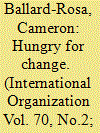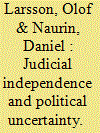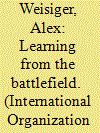|
|
|
Sort Order |
|
|
|
Items / Page
|
|
|
|
|
|
|
| Srl | Item |
| 1 |
ID:
147084


|
|
|
|
|
| Summary/Abstract |
The cross-border movement of people, goods, and information frequently results in legal disputes that come under the jurisdiction of multiple states. The principle of deference—acceptance of another state's exercise of legal authority—is one mechanism to manage such jurisdictional conflicts. Despite the importance of deference in international law and cooperation, little is known about the causes of variation in its use. In this article, we develop a theory of deference that focuses on the role that domestic institutions and norms play in ensuring procedural and substantive fairness. We test this theory in an original data set concerning accession practices in the Hague Convention on International Child Abduction. Our findings offer considerable support for the idea that states evaluate partners on the likelihood that they can offer a fair legal process. Exploring empirically the efforts against parental child abduction, we offer a nuanced account of the link between domestic institutions and norms and international cooperation. This account suggests that greater attention should be paid to the use of deference as a mechanism to manage the conflicts posed by globalization.
|
|
|
|
|
|
|
|
|
|
|
|
|
|
|
|
| 2 |
ID:
147081


|
|
|
|
|
| Summary/Abstract |
What drives autocrats to default on their sovereign debt? This article develops the first theory of sovereign debt default in autocracies that explicitly investigates survival incentives of political actors in nondemocracies. Self-interested elites, fearful of threats to their tenure because of urban unrest, may be willing to endure the long-term borrowing costs that defaulting creates rather than risk the short-term survival costs of removing cheap food policies for urban consumers. I test my main claims that both urbanization and food imports should be associated with greater likelihood of autocratic default using panel data covering forty-three countries over fifty years, finding that autocracies that are more reliant on imported food and that are more urbanized are significantly more likely to be in default on their external sovereign debt. I emphasize the regime-contingent nature of these effects by demonstrating that they are reversed when considering democratic sovereign default. I also substantiate the mechanisms put forward in my theory through illustrative historical cases of sovereign debt default in Zambia and Peru, in which I demonstrate that fear of urban unrest in the face of rapidly increasing food prices did indeed drive autocratic elites to default on international debt obligations. In addition to providing the first political theory of debt default in autocracies, the article introduces two robust predictors of autocratic default that have been overlooked in previous work, and highlights the importance of urban-rural dynamics in nondemocratic regimes.
|
|
|
|
|
|
|
|
|
|
|
|
|
|
|
|
| 3 |
ID:
147083


|
|
|
|
|
| Summary/Abstract |
There is broad agreement in the literature that international courts (ICs) make decisions with bounded discretion in relation to state governments. However, the scope of this discretion, and the determinants of its boundaries, are highly contested. In particular, the central mechanism in separation-of-powers models of judicial politics—the possibility of legislative override—has raised controversy. We argue that the uncertainty that judges face regarding the political reactions to their decisions has important and undertheorized implications for their behavior. On the one hand, cautious judges are likely to be attentive to signals that contain information about the probability of an unfavorable override. On the other hand, misjudgments of the political risks are likely to be made. Thus, the possibility of override is a significant factor affecting judicial behavior, but it is also a fairly blunt mechanism for balancing the independence and accountability of courts. The empirical study focuses on the Court of Justice of the European Union (CJEU), which has long been at the center of theory development regarding the legalization of world politics and the rise of international courts. The results demonstrate a strong correlation between the CJEU's rulings and the political signals it receives, in a pattern that goes beyond legal merit, and that fits with the override mechanism. State governments are crucial parts of the broader audience that defines the political boundaries of judicial discretion.
|
|
|
|
|
|
|
|
|
|
|
|
|
|
|
|
| 4 |
ID:
147082


|
|
|
|
|
| Summary/Abstract |
What drives leaders’ decisions about whether to continue or end an ongoing war? The private information explanation for war holds that leaders fight because they believe that doing so will advance national interests, and they settle hostilities when new information reduces their optimism about the possibility of long-term success. Yet significant theoretical disagreement exists about both the extent to which and the manner in which new information, especially battlefield information, promotes settlement. This article unpacks the logic of the informational mechanism, arguing that settlement will be more likely when there has been more extensive fighting and that countries are more likely to make concessions to end wars when battlefield results have deteriorated; short-term spikes in war intensity by contrast do not promote settlement. Moreover, building on work on leadership turnover and settlement, I show that leader replacement is sometimes part of the information-updating process, especially in autocracies: new leaders without political ties to the person in power at the start of the war are more likely both to come to power when war is going poorly and to end wars once in office. Tests of these arguments make use of new participant-level data on the timing of battle deaths for all Correlates of War interstate wars, which allows me to examine the effects of changing battlefield developments across a wide range of cases in a manner that was previously impossible.
|
|
|
|
|
|
|
|
|
|
|
|
|
|
|
|
| 5 |
ID:
147080


|
|
|
|
|
| Summary/Abstract |
By the end of the twentieth century, a scholarly consensus emerged around the idea that oil fuels authoritarianism and slow growth. The natural abundance once thought to be a blessing was unconditionally, and then later only conditionally, a curse for political and economic development. We re-examine the relationship between oil wealth and political regimes, challenging the conventional wisdom that such natural resource rents lead to authoritarian outcomes. We contend that most efforts to examine the causal linkages between natural resource abundance and political regime have been complicated by the likelihood that both democracy and oil revenue are endogenous to the industrialization processes itself, particularly in its developmentalist form. Our quantitative results, based on an analysis of global data from 1970 to 2006, show that both resource endogeneity and several mechanisms of intraregional regime diffusion are powerful determinants of democratic outcomes. Qualitative evidence from the history of industrialization in Latin America yields support for our proposed causal claim. Oil wealth is not necessarily a curse and may even be a blessing with respect to democratic development.
|
|
|
|
|
|
|
|
|
|
|
|
|
|
|
|
| 6 |
ID:
147079


|
|
|
|
|
| Summary/Abstract |
The institutions of global governance have changed dramatically in recent years. New organizational forms—including informal institutions, transgovernmental networks, and private transnational regulatory organizations (PTROs)—have expanded rapidly, while the growth of formal intergovernmental organizations has slowed. Organizational ecology provides an insightful framework for understanding these changing patterns of growth. Organizational ecology is primarily a structural theory, emphasizing the influence of institutional environments, especially their organizational density and resource availability, on organizational behavior and viability. To demonstrate the explanatory value of organizational ecology, we analyze the proliferation of PTROs compared with the relative stasis of intergovernmental organizations (IGOs). Continued growth of IGOs is constrained by crowding in their dense institutional environment, but PTROs benefit from organizational flexibility and low entry costs, which allow them to enter “niches” with limited resource competition. We probe the plausibility of our analysis by examining contemporary climate governance.
|
|
|
|
|
|
|
|
|
|
|
|
|
|
|
|
|
|
|
|
|